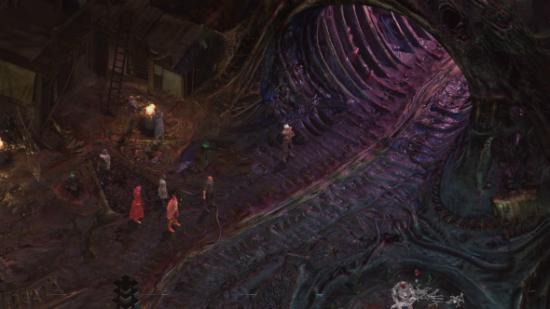If you’re paying attention you’ll know that we’re going through an exciting period for RPGs. After about a decade of dross, the RPG started to undergo a period of experimentation and this effort is now hitting its stride with the likes of Divinity: Original Sin, Torment: Tides of Numenera, and Tyranny.
Make sure you check out our list of the best RPGs you can play on PC.
These are games that are breathing life back into the corpse of the literary RPG and taking it in new directions. It’s got to the point now, in fact, that if you’re looking to get into playing these RPGs you’re spoiled for choice.
This is where Chris found himself recently, and knowing that Jeremy is an avid Dungeons & Dragons-based RPG fanatic, he thought to seek his advice when figuring out which of these RPGs to play. The following is their conversation.
Chris: Jeremy, I have a question for you.
Jeremy: Hi.
Chris: Have you played Tides of Numenera?
Jeremy: Yes. I love it.
Chris: Should I play it?
Jeremy: Yes. Although it’s quite hard work, in a literal sense – you have to get your imagination into gear. Does that make sense?
Chris: Yeah I think so. There’s lots of reading?
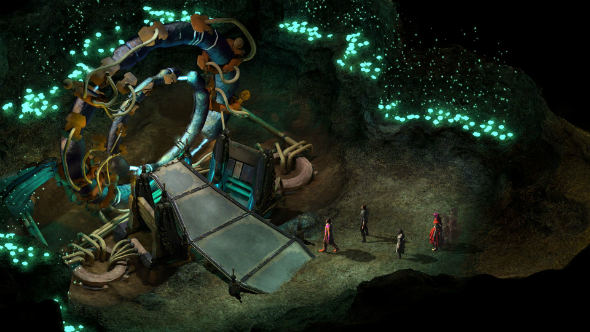
Jeremy: What I mean is: your average scene in Tides will give you all the tools you need to interpret what’s going on, then ask you to do the rest. You’ll have a description of a strange machine, what sort of metal it’s made from, whether it’s vibrating or humming, and usually some sort of really weird detail – the fact that it makes you feel warm yet repulsed, or emits a strange whisper that reminds you of childhood.
Chris: Ooh, yeah. That’s what I was hoping for.
Jeremy: Then you’ve got to piece all of that together in your head and come up with an image. The art assets on the screen are really just the barest representation of what’s going on. Often it’s a lot like – gasp – reading a book. Are you up for that?
Chris: Well, I just finished Planescape the other week.
Jeremy: You’ll be fine then. It’s really excellent. My only reservation about it is that it maybe doesn’t pace as well as some of the other Black Isle-style RPGs. But that’s because it’s so forward thinking, and never forces combat, so you don’t get that natural switch up between prose and fighting.
Chris: Oh, that’s good, I’m really into that!
Jeremy: Haha! Yeah, it’s incredibly satisfying from that standpoint. And also from the perspective of ‘hmmm, I wonder if this particular ability / character / idea could provide a solution to that side-quest I was looking into half an hour ago’. Very impressive in that regard.
Chris: Yeah that’s the good shit. That’s what Divinity is great at too, right?
Jeremy: Yeah, it’s very much the match of Divinity in that. Doesn’t have all of the environmental systems of Divinity, but it’s better at making stories reactive /and/ meaningful. Tides of Numenera feels like it’s had the bland filler surgically removed. Probably in an underworld surgery within the belly of a living city.
Chris: Yeah, I’m into anything that isn’t traditional stuff, really. As in forced combat encounters and bland stories. Are you following No Truce With The Furies at all?
Jeremy: No, I haven’t heard of that one.
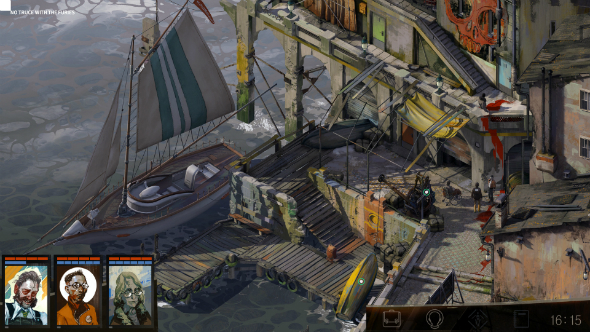
Chris: Well, No Truce With The Furies has some real interesting ideas, especially in regards to dialogue. Here’s a bit from its website on it: “No Truce With The Furies takes non-combat skill use to absurd new heights. You can sing, dance, pay rent and actually fail at skill checks with profound results. Built by D&D evangelists, we use the rule system to represent real life.”
Jeremy: God, that sounds really good. Just looking at it now – that’s a really interesting setting.
Chris: It has this thing called the thought cabinet: “You have an inventory for thoughts. Pick up old mysteries, develop new ideas. Come to conclusions both light and dark. You will develop obsessions you can’t get rid of, and beliefs that guide your words and change the way you talk.”
Jeremy: Haha, fantastic!
Chris: What’s most interesting about it is that the developers say they think of the RPG as an “emergent art form.” I didn’t really know what they meant at first. But having looked more closely at it, as well as the kinds of games it’s inspired by – all the D&D-based RPGs, as well as Kentucky Route Zero for its approach to dialogue – I’ve begun to see what they mean. So now I’m interested in exploring these other RPGs and especially how they allow so much dynamic and bizarre, unexpected action with nearly every interaction and encounter.
Jeremy: Huh, yeah – the western RPG hadn’t felt like an emergent art form for a long time, until maybe a year or two ago. It feels as if the first wave of Kickstarter RPGs allowed devs to pick up where they left off in 2000, before publishers and the move to 3D pretty much killed literary RPGs, and that was good. But now we’re moving beyond nostalgia into this more experimental space. Have you played any Tyranny?
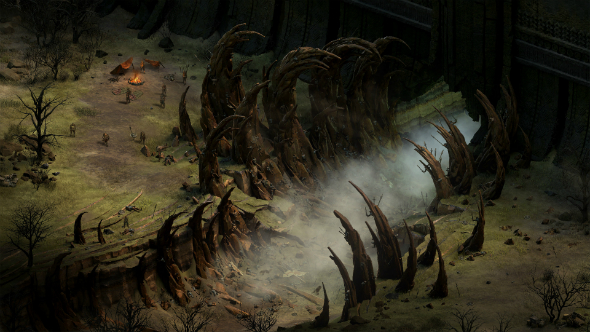
Chris: I have played some Tyranny. I need to play more actually. But yeah, that’s a real good example of a studio taking older ideas and spinning them in new light. What do you like about it in particular?
Jeremy: Ooo, what first. OK: one clever thing it does is be quite short. Tyranny is as reactive as you remember Baldur’s Gate and Icewind Dale and all those other old RPGs to be before you go back and replay them. And it manages it by picking a tight focus – just a couple of pockets of resistance in one corner of a world otherwise ruled by evil – and sticking to a handful of characters. There are a few factions in Tyranny, but I don’t think of them so much as the faces that represent them. The paternal and grumpy Graven Ashe. The Voices of Nerat. He’s got a few faces, actually. Sorry, am I gushing?
Chris: I do feel damp. But no, that’s good, and gels with my impressions of it. By focusing on something a little smaller they seem to have made something quite dense and that won’t sap all your time as you play it once, twice, thrice. Which is what these games are for, to an extent, right? You want to explore these spaces and scenarios multiple times and probe them in different ways.
What I’m really into, from the little I’ve played of these types of games, is how each choice you make – no matter how small – feels like it’s had an impact on the world in some way, and that you then have to live with the consequences of that, which can be tiny or very large. A lot of RPGs during that slump period you mentioned seemed to pipe you down a single lane and only gave the impression of choices and consequences, rather than committing you to them. Now what we’re seeing are RPGs that make their stories more personal and surprising.
Jeremy: Yeah, it certainly felt like the genre had got into the habit of promising consequences for every decision, but compromised to deliver on some unspoken expectations instead – not least length. What Tyranny makes you realise is that having a real impact is /terrifying/. That game puts you in a very public role and lets all of your superiors and underlings look on, judging you. Any dialogue choice, no matter how innocuous, could feasibly affect your standing. It’s the only RPG I’ve ever played in which I’ve chosen not to follow an intriguing line of questioning, because it might upset somebody important.
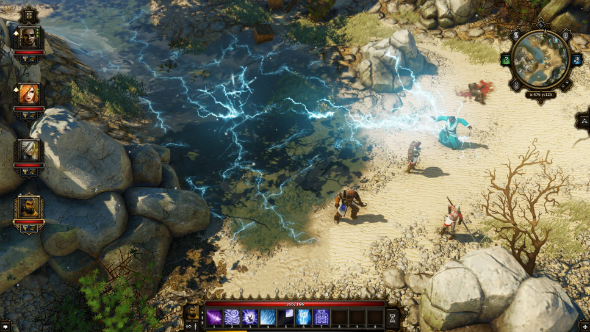
There’s another series that’s pushing the genre forward by packaging things in a more compact way, and that’s Divinity. Usually you’d block out at least half an hour to do anything more ambitious than tie your shoelaces in Divinity, but the multiplayer in Original Sin II is already quite different.
Chris: Go on.
Jeremy: They’ve been working on this PvP mode in Early Access, and I honestly didn’t think it was going to work. Why would all the classes and skills they’d built for the campaign balance out in competitive combat? Even Blizzard faffed about for years trying to make that work for Diablo III.
But, er, it does work. I can’t claim to understand why, but Divinity is this really successful turn-based battler on the side now. You fight across maps with lots of ladders and explosive barrels, and it feels like one of the more intimate tabletop Warhammer spin-offs: Mordheim, maybe. Or XCOM, but then everything’s a bit like XCOM isn’t it. This feels new. Then they’ve got this whole dungeon master mode in the works, which is a completely different kind of exciting madness. I suppose I never really expected the innovation in RPGs to come from other people. It’s a proud misanthrope’s genre, traditionally speaking.
Chris: I’ve heard about this Game Master mode. Is this pushing it more towards the tabletop games that these RPGs are all derived from? That’s what has really grabbed me about them, not so much the combat itself – although I’ve heard Divinity’s is really dynamic and interesting on a systems level, how they interact to produce unexpected results – but the possibilities they offer to manipulate each moment.
Like, having not long finished Planescape, what gripped me about it was that each character and item seemed to have their own enclosed story going on, parallel to my own, and that felt just as important to its world as anything else. Like one guy I spoke to starts muttering about a lost fork, then pulls an ear out of his pocket and whispers into it – he’s not interested in my quest, instead he has his own problems going on, and his characteristics and mannerisms give him a sense of history, like he’s actually been through some shit. At the very least there’s entertainment to be had just talking to other characters and finding out what’s going on with them in that game. Some are so strange in their behaviours and idiosyncrasies – much more than the bland one-liners you get in, say, Oblivion.
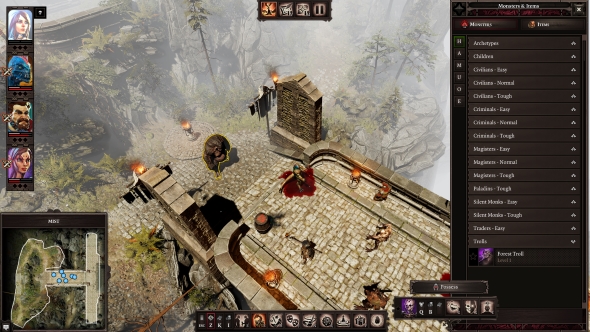
Jeremy: That’s exactly what they’re pushing towards, yeah. The thing computer RPGs have always struggled with is the idea that a pre-written story, no matter how branching, can never be as reactive as a good Dungeon Master. In Divinity II’s mode, as around the table, the idea is that a DM can accommodate a player who’s more interested in the backstory of the blacksmith than the castle on the horizon, and rustle up a new story about how difficult it is to turn a profit tanning animal hide, or whatevs.
By rights we should be over this by now. Computer RPGs have been around long enough that new ones could look exclusively to digital predecessors for inspiration, and yet designers are still volunteering to tackle the tabletop problem. That leads me to think it’s not merely an inferiority complex that finds devs still clinging to D&D: there’s something important there for us yet to capture. Whether they manage it or merely use that impetus to swing off into as-yet-undefined directions, it feels healthy. Nostalgia might have got us here but it’s not steering the genre anymore.
Chris: Do you see each of these games – to list them: Pillars of Eternity, Divinity, Torment: Tides of Numenera, and Tyranny – all trying to tackle this same issue? And are they doing it differently to each other or are they milling around the same ideas? That’s what I’m really looking to find out, I suppose, how are they trying to achieve the ultimate dream of this kind of RPG and how close are they to getting there, do you think?
Jeremy: Mmm, that’s a good question. And as a fellow interviewer, you’ll know that’s code for ‘I don’t really know the answer’. But I do know that Pillars and Tyranny still have one foot in the past: a combat system inherited from the Infinity Engine. I don’t know if that’s necessarily a problem, because it allows them to grow quietly in other areas, and I think if Tyranny has a future as a series, it’ll further furrow that meaningful reactivity that Obsidian have pursued for so long.
Torment is an interesting one: RPG combat isn’t like an appendix. You can’t simply remove it without missing some of what it does, for pacing and tactics. Long-term, I think Tides of Numenera developers InXile are going to have to build something new to fill that gap. And that’s exciting. I’m not even going to try and predict where Divinity and Larian will go next, because I would never have guessed the direction they’ve gone in with Original Sin II. That one truly is the great unknown.
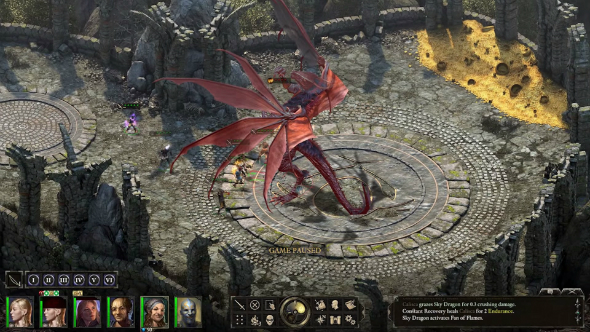
Chris: OK, OK, so if you had to give me one good reason to play each of these games, what would it be? And bear in mind that I’m mostly interested in the world building side of them, as well as anything new or experimental they do?
Jeremy: OK, yep, crunch time. I think the best thing to do is give you a question each of these games answers.
For Tyranny, the question is: what if Sauron was a communist, and you were on his PR team?
In Torment, it’s that curiosity killed the cat. But if death didn’t stick, and the world was full of potentially lethal curiosities, what could you discover?
And for Divinity, what chemistry happens if I cast a lightning bolt into a poison cloud? And how much comedy alliteration can a writer squeeze into one dialogue box?
Pillars of Eternity is great, but the question’s more mundane there: what if Baldur’s Gate II wasn’t beholden to decades of D&D rules and lore? I really think of Pillars as the necessary and brilliant building block that enabled the forward push of Tyranny.
Chris: Haha, that’s a great way of breaking them down. It’s great that they’re all pushing in slightly different directions. There’s also No Truce With The Furies, of course, which has its own “fantastic realism” going on, and is looking to explore what happens when an RPG uses dialogue and inner thoughts as a toy box with which to manipulate its world and characters.
What’s perhaps most surprising, for me, as someone who dismissed D&D for so long because it was sold as traditional, generic fantasy, is how using D&D as a basis actually allows for so many different RPG experiences. My encounters with it in the past have always been people cribbing the most boring parts of it – literally dungeons and dragons – rather than seeing that D&D is really all about inviting you to imagine your own type of fantasy and to explore it in great detail.
I’m sure there are people who will disagree with that and argue that the rules matter a whole lot and whatever, but I’m not interested in that, and these games don’t seem to be so much either. Am I wrong here?
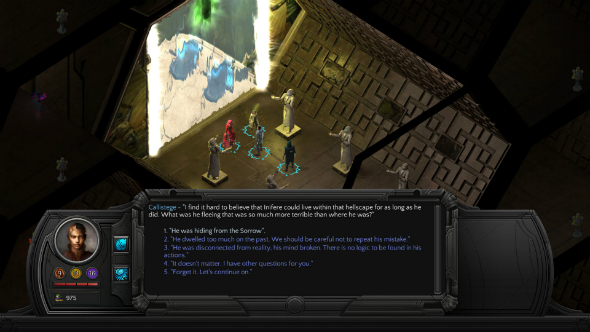
Jeremy: Nah I think that’s spot on, really. Just as developers have tended to nick the shoulderpads and endless war from Games Workshop rather than the punk and socialism, D&D has been somewhat misrepresented in videogames. Yes, the flagship Forgotten Realms is largely Tolkien-esque and temperate. But the Numenera setting is a conscious attempt to recapture the strange abandon of Planescape, which was all D&D. And the continued attempts to distill Dungeon Mastering – from Neverwinter Nights, to Sword Coast Legends, to Divinity: Original Sin II – indicate that developers remember the best bit of D&D. Clearly they reckon it still has something to offer us that we’re not getting elsewhere in videogames: a structured playspace for the imagination. And kobolds. I like kobolds too sometimes.
Chris: Don’t they steal children? You’re a monster! But yes, thanks Jeremy, you have enlightened me and I feel good. I guess I’ll go and play Tides of Numenera now. Gonna plug my skull into my PC and see where I end up…
Jeremy: Probably dead, but then you’ll wake up and have learned something for the experience. A bit like the western RPG genre over the last decade or so? Yeah, let’s go with that.
